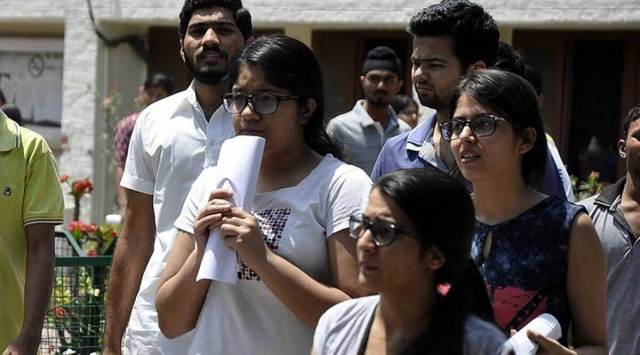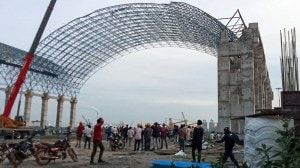Ritika Chopra, an award-winning journalist with over 17 years of experience, serves as the Chief of the National Bureau (Govt) and National Education Editor at The Indian Express in New Delhi. In her current role, she oversees the newspaper's coverage of government policies and education. Ritika closely tracks the Union Government, focusing on the politically sensitive Election Commission of India and the Education Ministry, and has authored investigative stories that have prompted government responses. Ritika joined The Indian Express in 2015. Previously, she was part of the political bureau at The Economic Times, India’s largest financial daily. Her journalism career began in Kolkata, her birthplace, with the Hindustan Times in 2006 as an intern, before moving to Delhi in 2007. Since then, she has been reporting from the capital on politics, education, social sectors, and the Election Commission of India. ... Read More
JEE Main preparation: 10 lakh masks and gloves, 6,600 litres of sanitiser
This is the blueprint being adopted by the National Testing Agency (NTA) at 660 test sites for JEE (Main), the first national-level entrance examination since the Covid outbreak.
 For JEE (Main), which is a computer-based test, scheduled to held from September 1 to September 6, different computer labs in the Tricity have been selected.
(Representational Image)
For JEE (Main), which is a computer-based test, scheduled to held from September 1 to September 6, different computer labs in the Tricity have been selected.
(Representational Image)Ten lakh masks, 10 lakh pairs of gloves, 1,300 infrared thermometer guns, 6,600 litres of hand sanitiser and an equal amount of disinfectant liquid, 6,600 sponges, 3,300 spray bottles and 3,300 cleaning staff — all at an additional cost of almost Rs 13 crore.
JEE Main, NEET 2020 LIVE Updates: Education Minister says exams to be conducted on students’ demand
This is the blueprint being adopted by the National Testing Agency (NTA) at 660 test sites for JEE (Main), the first national-level entrance examination since the Covid outbreak.
Although various state governments have joined the chorus to defer the tests citing health concerns, the Centre has decided to go ahead with JEE (Main) and NEET as planned, saying that a year would be lost otherwise and future admissions affected.
READ | Lockdown Diaries: 7 students from around the world share their lockdown experiences
JEE (Main), an online exam for engineering aspirants, is scheduled to be held from September 1 to 6 and NEET, a pen-and-paper exam for medical and dental courses, on September 13.
About 8.58 lakh students have registered for JEE (Main), which will be supervised by 1.14 lakh invigilators.
Read | Lack of transport facilities, fear of contracting COVID among worries of NEET, JEE exams aspirants
Before the outbreak, the NTA had identified 570 test centres for JEE (Main), which has now been increased so that candidates are accommodated in alternate seats to maintain social distancing. The number of shifts has been increased from eight to 12, and the number of candidates per shift reduced from 1.32 lakh to 85,000.
“Earlier, we had planned to assign two invigilators for 30 students. We have brought that down to two for 15. Hence, our requirement of invigilators has doubled to 1.14 lakh,” NTA Director-General Vineet Joshi told The Indian Express.
The test will be held in two shifts, of three hours each, every day. The timings have been tweaked for sanitising the premises. “The first shift from 9.30 am to 12.30 pm will be held from 9 am to noon and the second shift will start at 3 pm instead of 2 pm. This will give us time to sanitise the computer labs for the second shift,” Joshi said.
Read | JEE Main, NEET 2020 to be conducted on students’ demand: Ramesh Pokhriyal
Candidates have been assigned time slots for reporting at the centres to avoid crowding — a maximum of 40 students can report in one 20-minute slot.
According to Joshi, these Covid-related precautions will cost the Agency an additional Rs 150 per candidate. Pre-Covid, he said, the NTA would have spent Rs 400 per candidate for conducting the JEE (Main) alone.
Officials said the SOP has been developed by IT major Tata Consultancy Services in association with the All India Institute of Medical Sciences (AIIMS) and Public Health Foundation of India.
Also Read | Must hold JEE, NEET or will lose a year: Education Secy Amit Khare
They include: staggered, touch-free entry into the centre; checks for symptoms along with Aarogya Setu app status verification; sanitisation before entry into the exam hall; touch-free security checks, document verification, and registration; non-intrusive, touch-free ID verification before, during and after exam; multiple layers of hygiene norms for candidates and exam staff; and, adoption of social distancing norms at all times.
With just a few days left, preparations are gathering pace. At the Subhash Chandra Bose High School, one of the three centres in Bihar’s Muzaffarpur town, staff said they are “ready for the big challenge” — the district has recorded 5,506 Covid cases so far.
“The centre has arranged masks and sanitisers, every computer has been sanitised. Parents and guardians have been requested to not crowd the centre. We know the city has a good number of cases, but we are following all safety norms and all staffers have been given training,” said Rameshwar Singh, the centre in-charge.
(With ENS in Bengaluru & Patna)



- 01
- 02
- 03
- 04
- 05





























